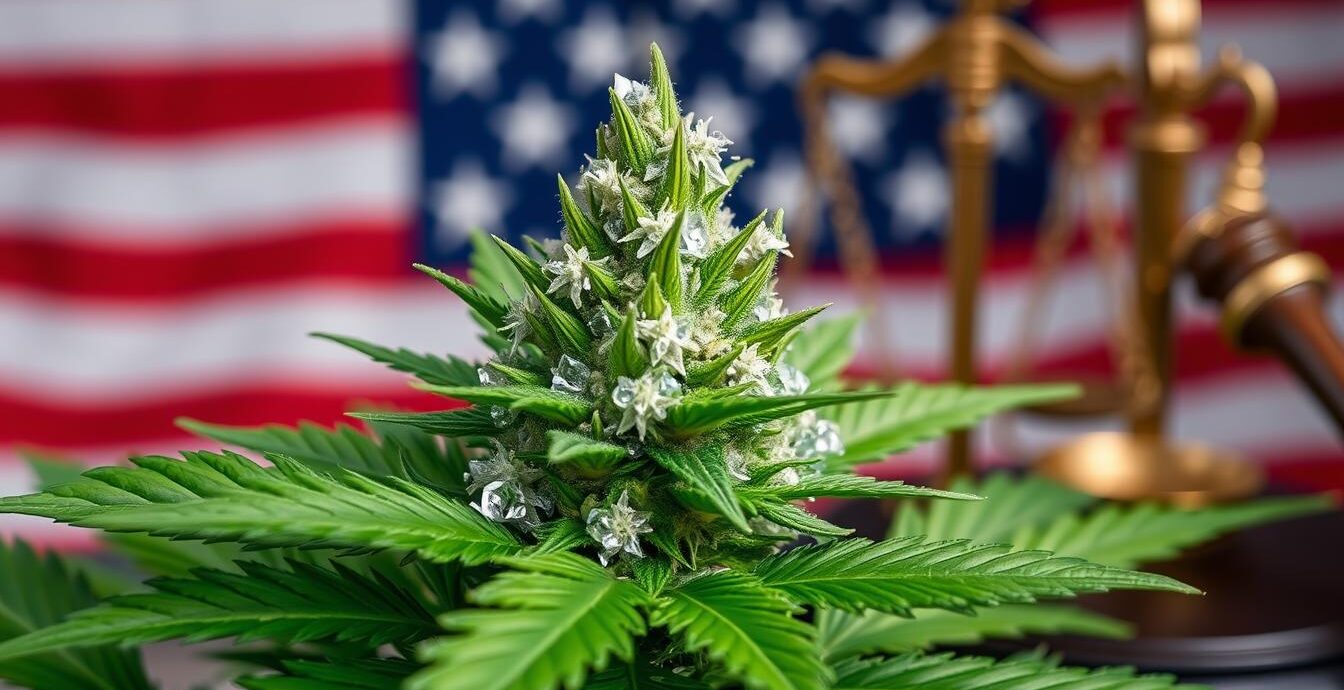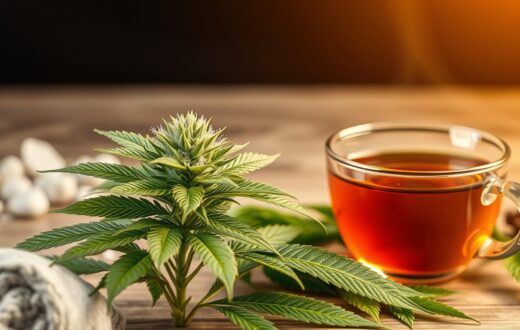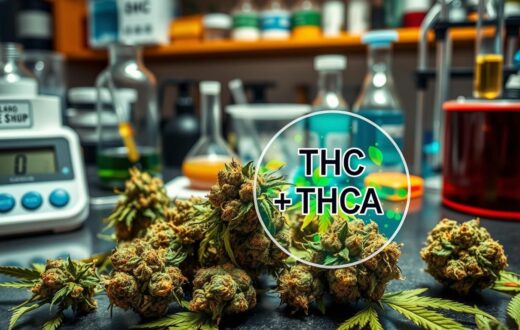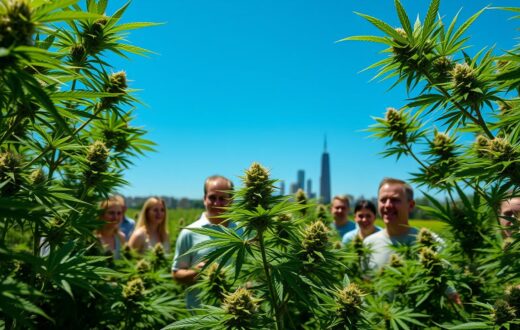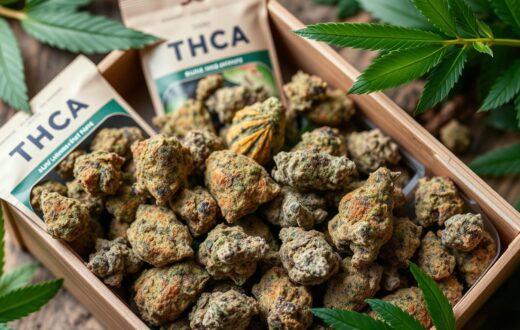Are you trying to figure out cannabis laws? The status of THCA in the USA is tricky. Let’s explore this interesting topic and untangle the legal issues around THCA.
THCA’s legality is a big deal in the cannabis world. The 2018 Farm Bill made hemp and its products legal at the federal level. But, the law about THCA is still unclear. It says hemp products, including THCA, must have less than 0.3% delta-9 THC. This has led to a lot of debate about THCA rules across the country.
Even though THCA doesn’t get you high, it turns into THC when heated. This has caused confusion about THCA rules. The DEA’s view on THCA has many in the hemp industry worried. They think most hemp growers might not follow these rules.
State laws make the THCA situation even more complicated. Some states allow THCA products, while others ban them. This mix of laws makes it hard for both consumers and businesses. As lawmakers look at the Farm Bill again, THCA’s legal future is uncertain.
It’s important to know about THCA’s legal status. Whether you’re just curious or run a business, understanding these rules is key. Let’s dive deeper into the world of THCA and its role in U.S. law.
Understanding THCA: What You Need to Know
THCA is a key part of cannabis plants, playing a big role in the thc acid legality debate. It’s important to understand its nature and how it differs from THC.
Definition of THCA
THCA stands for tetrahydrocannabinolic acid. It’s a non-psychoactive compound found in raw cannabis plants. THCA is the precursor to THC, the well-known psychoactive component in marijuana. The legal status of thca depends on its potential to convert to THC when heated, a process called decarboxylation.
How THCA is Different from THC
The main difference between THCA and THC lies in their effects on the body. THCA doesn’t produce the “high” associated with THC. This distinction is crucial for understanding thc acid legality. The Farm Bill of 2018 legalized hemp-derived products containing 0.3% THC or less, which includes many THCA products. However, when THCA is heated, it converts to THC, potentially crossing legal thresholds.
Research on THCA’s benefits is ongoing. A study on mice showed potential neuroprotective effects, suggesting it might help with cognitive function. However, most studies have been conducted on animals, and more human research is needed to confirm medical benefits. The legal status of thca remains complex, varying by state and product form.
The Legal Landscape of Cannabis in the United States
The U.S. has seen big changes in how it views cannabis. It went from being strictly banned to slowly accepting it. This change has been different in each state.
Brief History of Cannabis Legalization
Cannabis was banned in the 1930s. But, people’s views changed, leading to calls for legalization. The 2018 Farm Bill was a big step. It made hemp legal, which includes plants with less than 0.3% THC. This allowed for products like those with THCA to be made.
Current Federal Cannabis Laws
At the federal level, marijuana is still seen as a controlled substance. The DEA has trouble explaining the laws about THCA clearly. The rules for THCA are complex, with the DEA saying THC levels should be checked after decarboxylation. This makes understanding THCA’s legal status even harder.
State-Level Legalization Variances
State laws on cannabis are all over the place. Some allow both medical and recreational use, while others ban it. For example, Pennsylvania and New Jersey have different views on federal hemp laws. New Jersey sticks to federal rules, but Pennsylvania considers parts of the hemp plant legal, including THCA. This shows why it’s important for businesses and users to know the local laws.
THCA and the 2018 Farm Bill
The 2018 Farm Bill changed the game for hemp and its products in the U.S. It redefined hemp and opened new opportunities. Let’s look at how this bill affects THCA and its legal status.
Key Provisions of the Farm Bill
The Farm Bill made hemp legal at the federal level. It defined hemp as cannabis with less than 0.3% THC by dry weight. This change allowed for the growth and sale of hemp products across states.
The bill also removed hemp from the Controlled Substances Act. This was a big change in cannabis policy.
THCA in the Farm Bill Framework
The legal status of THCA under the Farm Bill is complex. The bill focuses on THC content but doesn’t mention THCA. This has raised questions about THCA’s legal status federally.
The DEA’s stance makes things even more complicated. They count THCA towards the THC limit, which could make many hemp products illegal. This creates uncertainty in the industry.
State laws also add complexity to THCA’s legal status. Some states worry about the unintended legalization of THC variations like THCA. Federal courts have handled state law preemption differently in each case. This has led to varied outcomes across the country.
As the Farm Bill nears its end, the hemp industry is watching closely. They are waiting to see if changes will affect THCA’s legal status.
Is THCA Considered a Controlled Substance?
THCA’s legal status is a topic of debate. It’s tied to THC and the interpretation of laws. This makes its classification as a controlled substance complex.
Classification under the Controlled Substances Act
THCA’s status is not clear-cut. The DEA puts it in Schedule I, saying it has no medical use and is highly addictive. But the 2018 Farm Bill changed things. It allows hemp products with less than 0.3% THC, which complicates THCA’s legal position.
The Role of Delta-9 THC in Legal Discussions
Delta-9 THC is key in THCA’s legal battle. When heated, THCA turns into THC, which regulators consider the same. For THCA to be legal, it must have less than 0.3% delta-9 THC. This rule affects its legality in different states.
The DEA is looking into changing how it classifies cannabis. This could change THCA’s status. Some states have their own rules for THCA. For example, Colorado lets adults use THCA products, while Wisconsin only allows it for medical use. These differences show how complex the legal situation around THCA is.
Differences Between THCA and THC
It’s important to know the difference between THCA and THC. These two cannabinoids have unique effects and legal statuses. Understanding this helps with thca regulation and its legal standing.
Psychoactive vs. Non-Psychoactive Properties
THCA is non-psychoactive, meaning it doesn’t cause a “high.” THC, however, is known for its psychoactive effects. When THCA is heated, it turns into THC. But, only about 87.7% of THCA becomes THC.
Potential Benefits of THCA
THCA’s legal status is complex due to its potential health benefits. It may help with inflammation, nausea, and protect the brain. This has made THCA products popular.
Some THCA flower strains have up to 40% THCA. This means they could have about 35% THC when smoked. This high potency raises both medical and regulatory concerns.
The 2018 Farm Bill is key in regulating THCA. It makes THCA legal federally if it comes from hemp with less than 0.3% THC. This has made THCA products more available, despite ongoing debates about its legal status in different states.
Legal Status of Cannabinoids Across States
The laws about thca vary a lot in the United States. The 2018 Farm Bill made THCA legal at the federal level. But, each state can make its own rules. This makes it hard for people and businesses to know what’s legal.
Variability of State Laws
THCA laws change from state to state. Some states follow federal rules, letting THCA products with less than 0.3% THC. For example, Texas lets people buy and use THCA, just like the federal law says.
Over 7,700 stores in Texas sell hemp products. This shows the market is growing.
Notable States with Distinct Regulations
California, Colorado, and Washington allow recreational cannabis. This means THCA products are legal there too. But, states like Idaho and Louisiana say THCA is illegal.
Wisconsin only lets medical marijuana patients use THCA. Arkansas, Minnesota, Oregon, and Rhode Island don’t allow THCA products. This shows how different the laws are. It’s key to know the local laws about THCA.
Potential Legal Risk for Consumers
Federal THCA restrictions and THCA regulation make things complicated for consumers. The laws about THCA products differ from state to state. This means it’s very important to know the laws in your area.
In some places, strict rules about cannabis can lead to legal trouble for users.
Factors Influencing Legal Risks
Several things can affect the legal risks of THCA products. The amount of THC in the product is a big factor. Federal law says hemp can’t have more than 0.3% THC by dry weight.
Some states, like Florida, have even stricter rules. For example, Florida limits THC to 2mg per serving. How the product is made and local laws also play a role in its legality.
Importance of Source and Lab Testing
To avoid legal problems, it’s best to buy from trusted suppliers. Lab tests are key to check if the product meets legal standards. With 104 different cannabinoids in cannabis, testing is crucial.
It ensures the product is labeled correctly. This helps consumers make smart choices. As laws about THCA change, it’s important to stay informed to use it safely and legally.
The Future of THCA Legislation
The legal status of thca is changing as cannabis laws evolve in the United States. The 2018 Farm Bill, extended until September 2024, could alter thca federal law. This change affects how THCA products are regulated and sold across the country.
Trends in Cannabis Policy
States have different rules for hemp-derived cannabinoids. California has rules for “total THC” in products. Nebraska has made it clear what is legal for CBD products.
Florida wants to limit delta-9 THC in hemp items. South Dakota aims to ban chemically modified hemp products. These state actions might influence future federal THCA rules.
Potential Changes in Federal Law
The DEA is stricter on THCA testing, enforcing the 0.3% THC limit. This could impact many THCA products on the market. The Miller amendment to the 2024 Farm Bill could redefine hemp to include only non-intoxicating cannabinoids.
If passed, this could greatly affect the hemp industry and THCA’s legal status. The future of THCA legislation is unclear. Court decisions, like the Ninth Circuit’s AK Futures v. Boyd Street Distribution, could shape how federal agencies view hemp laws.
As the cannabis world changes, it’s important to stay updated on THCA’s legal status. This is crucial for both consumers and industry players.
Court Rulings Affecting THCA
Legal fights have changed how we see THCA. Recent court decisions have raised questions about THCA’s status. These rulings change how we view hemp products and their legal standing.
Significant Legal Cases
The Anderson v. Diamondback Investment Group, LLC case made THCA famous. It was about THC testing and hemp products in the workplace. The court’s ruling showed how tricky cannabinoid laws can be.
Impact of Court Decisions on THCA Status
In 2024, the Fourth Circuit Court of Appeals made a big ruling. They said THC-O is legal hemp under the 2018 Farm Bill. This goes against the DEA’s view that THC-O is illegal.
This ruling could change THCA’s legal status a lot. It shows that the amount of delta-9 THC is crucial. The court’s view on “hemp” including its acids, like THCA, might change the cannabis industry.
The Role of Advocacy Groups
Advocacy groups play a big role in shaping THCA rules and research. They work hard to change laws about THCA and other cannabinoids. They aim to teach lawmakers and the public about these compounds’ benefits and legal issues.
Organizations Promoting Legal Research
Groups like the U.S. Hemp Roundtable lead in promoting legal research on THCA. They push for clearer rules and more studies. The 2023 National Cannabinoid Report values the U.S. hemp-derived cannabinoid market at $28.4 billion. This shows the growing importance of advocacy work in this field.
Efforts Toward Changing Regulations
Advocacy groups are working to change THCA regulations. They’ve had some wins. The Fourth Circuit Court ruled that THC-O-acetate is legal under the 2018 Farm Bill. This goes against what the DEA says. It might help change how THCA is seen legally.
But there are challenges too. Some lawmakers want to limit what counts as legal hemp. This could affect THCA’s status. Advocacy groups keep fighting for fair laws and more research on THCA and other cannabinoids.
Consumer Awareness and Education
It’s important for consumers to know about THCA federal law in today’s cannabis world. The rules on THCA change from state to state. Even though THCA is a Schedule I substance federally, some states have softer laws.
Importance of Being Informed
Understanding if THCA is legal federally is key to making smart choices. THCA is found in raw cannabis and doesn’t get you high like THC. It turns into THC when heated, which is important to know about legal and health benefits.
Staying Updated on Legal Changes
To stay current on THCA laws, visit government sites and trusted cannabis news often. Laws on THCA differ a lot – California is more relaxed, while Georgia is stricter. The FDA is also looking into THCA for medical use, which could change federal laws. Always check your age before buying THCA products, and remember, both state and local authorities enforce THCA laws.
Conclusion: Navigating THCA Legality
The legal status of THCA is complex in the United States. The 2018 Farm Bill made hemp products, including THCA, legal if they have less than 0.3% delta-9 THC. This rule has led to different rules for THCA in each state.
Summary of Key Points
THCA laws vary greatly from state to state. Some places like California and Colorado allow its use, while others, like Idaho and Minnesota, have stricter rules. Hemp-derived THCA is legal in states like Arkansas and Kentucky. In places like Maine and Nevada, you can use it recreationally.
Recommendations for Consumers
Because laws change, it’s important for consumers to know their local rules. Always buy THCA from trusted sources and check its quality with lab tests. Remember, laws about THCA can shift, so keep up with updates.
For those interested in THCA flower, be extra careful. It can turn into THC. Even though some states allow THCA, others see it as a controlled substance. Always talk to legal experts if you’re unsure about THCA laws in your area.
Disclaimer
Understanding the legality of THCA in the USA is key. The info here is for learning only. The laws around THCA are complex and need expert help to understand.
Educational Purposes Only
This article tries to explain the current rules on THCA. Laws on cannabinoids change often. For example, the DEA now says the 0.3% THC rule in hemp also covers THCA. This could affect many hemp farmers.
Importance of Consulting Legal Professionals
Because cannabis laws are so detailed, we suggest talking to legal experts. They can help with questions about THCA’s legality in your area. Remember, state laws can be very different from federal ones.
For example, while the 2018 Farm Bill made hemp legal nationwide, some states like Indiana have their own rules. They ban smokable hemp products, which includes THCA flower.
Keep up with changes in local and federal laws on THCA and other cannabinoids. The legal scene is always shifting. There might be updates to the Farm Bill that could change the rules on hemp-derived THC products. Always follow both state and federal laws to stay safe in the world of cannabis.










